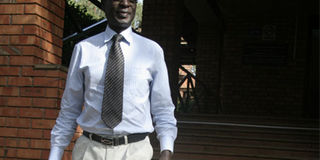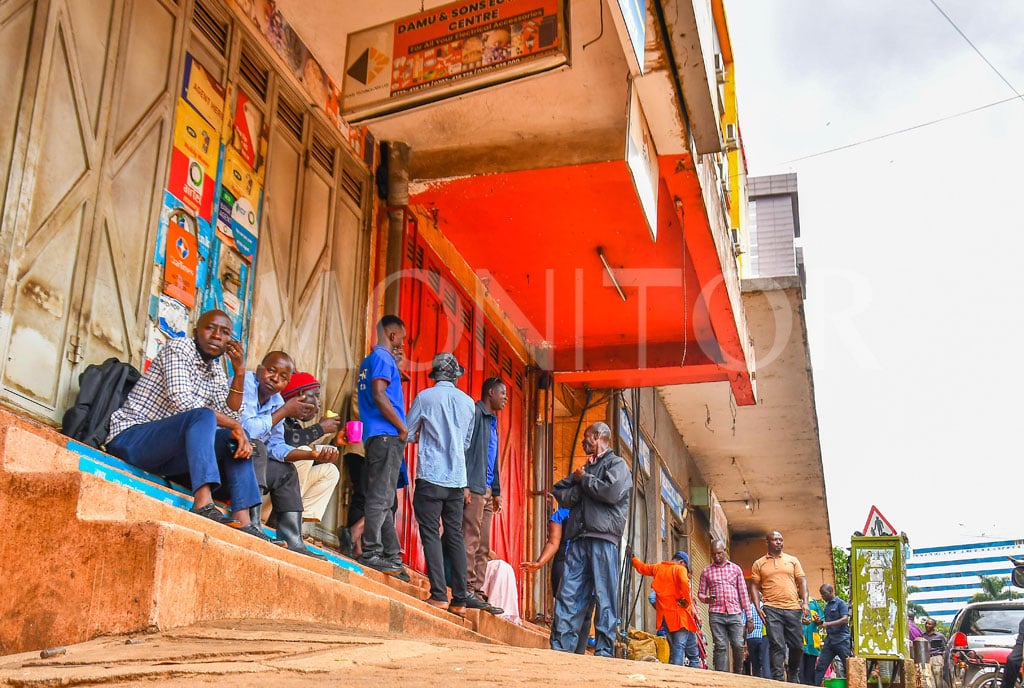Living Positively: Dr Watiti dedicated his life to fighting HIV/AIDS stigma

Dr Watiti thought he would not live for long after he found out he was HIV positive. Photo by Abubaker Lubowa.
What you need to know:
Dr Stephen Watiti does not know how he contracted HIV and it is not a question he wants an answer to any more. His focus is on helping others come to terms with their status and promote awareness of the scourge.
I was born 59 years ago in Mbale. I went to Nabumali High School and became a born-again Christian while there. This has been one of the fundamental changes in my life that shaped my future.
I studied Medicine at Makerere University from up to 1984 and worked in Rubaga as an intern doctor, then as a medical doctor up to 1988. I moved to Entebbe Road Clinic, up to 1991 and moved to Joy Medical Centre in Ndeeba until 2004 when I joined Mildmay Centre to date.
Finding out my status
I got married in 1985 and we had three children. The boy died from sickle cell anaemia, the girl is now at the university while the third died in 1993 having been born premature. This is actually the time when the problems began.
At the time, my wife became sickly and when she was tested for HIV, she was positive. She died in 1994. I also discovered I was HIV positive.
This was very hard because at the time having HIV was like a death sentence. I prayed for God to give me five more years so that my then four-year-old daughter would be nine years at least, if I was to die. There was no medicine and I was often ill, though I kept working. That was until 1999 when I became very ill.
The “five years” I asked from God were done; I put my daughter in boarding school and prepared for the inevitable, which almost came true. In 2000, I got full blown Aids. I had lung TB, Kaposi’s sarcoma, a cancer and meningitis. I had wounds in my mouth and on my face and sometimes I would cough blood.
Two things helped me; I felt I would improve and I wanted to be there for my daughter. Someone who visited me in hospital gave me a word of encouragement from the Bible to encourage me not to lose hope. It says “I shall not die, but I will live; I will talk about the great things that God has done for me.”
Prof. Moses Kamya, a friend, offered me a combination of drugs; these were ARVs. So, I began taking ARVs in 2000 and my condition improved. My friends bought me drugs until I joined Mildmay.
Joining the struggle
Most people do not want to be told they are HIV positive. But here I was HIV positive and doing fairly well. Then I made a decision to leave my general practice and go to work in the HIV/Aids field and help more people because I had been helped.
I talked to patients privately and then publicly. I disclosed my status to colleagues and began writing for New Vision newspaper in 2006 up to date. My column is aimed at zeroing infection, Aids-related deaths and discrimination of people living with HIV.
Talking publicly about HIV was to give it a face, more so, among professionals because there was this impression that this disease was for the “wretched of this earth”.
I was also motivated when I saw so many HIV positive children. Children need role-models, but if they do not see adults who have HIV and are doing the jobs they want to do, they give up. I wanted to mentor them.
I have to practice what I preach so teaching has helped me. I have been on ARVs for 12 years and my CD4 count has increased and my viral load has been maximally suppressed.
Handling stigma
It was difficult, I felt embarrassed and ashamed of myself. I did not know how I got infected and I do not know up to now--that’s one question I don’t try to answer. Neither my wife nor I had premarital sex, neither did I have extra-marital sex nor a blood transfusion; I guess I could have got infected in line of my work.
Facing hurdles
The people I told always advised me to keep the issue among ourselves. Some people associated HIV with promiscuity. That is one of the biggest hurdles I had to overcome.
I had to train myself to say, well, I didn’t do anything wrong or out of the normal. I abstained from sex, I was faithful; so what wrong did I do? Once I was over this self/internal stigma, then it was easier for me to overcome the social stigma. Stigma is like a door; the lock is inside, if you open for people, then they can hurt you.
Disclosing to my daughter
Telling my daughter was difficult but the turning point was when I put her in boarding school. One time she came home and told me I was taking the same drugs (Combivir) as a girl at school who had been rumoured to have Aids.
She was struggling so I knew I had to tell her. She was 13 and in P7. “Look, your mum had HIV and developed Aids, I hadn’t told you this; I also have HIV.” She was quiet, then I added, “But, now you see that since I am swallowing these drugs, I am not going to die. I believe I will be alive when you finish your university and if you want to get married, I will give you away.”
She started crying and so did I. I eventually took her back to school. She became shabby and slackened in her class work. Everyone wondered what I had done to her until I explained to the class teacher what I had said to my daughter.
The teacher was not pleased but I had not wanted to tell my daughter lies. I asked for a counsellor but there was none. There was another parent, however, Rev. Gideon Byamugisha who I was advised to talk to. He and another friend talked to my daughter who eventually understood the situation.
She picked up in her academics and scored 4 aggregates in the final examinations and joined Gayaza High School. Later on, she even wanted to change her name to Watiti.
It was tough but if I were to go back, with the knowledge I have now, I would have involved a counsellor and have her tested for HIV. Luckily, she did it herself and was negative. I encourage parents who are HIV positive to test their children.
Many said I was stupid to tell her and the public but thank God I did, and we are now good friends.
-------------------------------------------------
How he lives positively
I sleep under a mosquito net to protect myself from malaria. I tell people to drink clean safe boiled water to avoid water-borne diseases and I do the same. Examples of these are typhoid, dysentery and cholera among others.
I don’t take alcohol and I don’t smoke. I tell people you can live with this disease for as long as God has set out for you to live. I believe I am going to live a normal life. I am now 60 and I believe in the next years I will be around, if I die at 70 or more, that will be great.
This is what I teach people; we call this positive health. We tell people to avoid non-communicable diseases like diabetes and hypertension. I don’t eat some foods especially fat-rich foods. I also try to be active. I don’t go to the gym but I walk, and I also go and work in my garden.
I don’t want to die of high blood pressure after missing Aids. There is some behaviour that can be avoided, I check my kidneys and liver every six months, I do not burden my liver with alcohol.
As told to Stella Nakakande
If you have a story to share, send it to [email protected]




